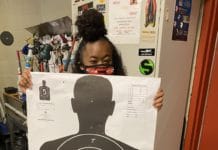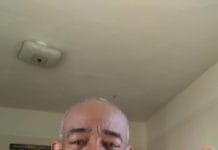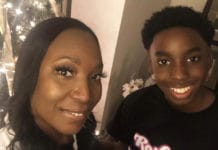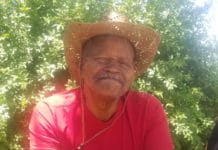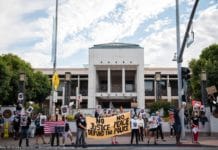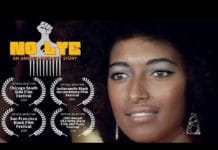by JR Valrey, Black New World Journalists Society
Rebellions, protests and racial tension have dominated the headlines of the COVID pandemic summer of 2020 following the police executions of Breonna Taylor and George Floyd. The San Francisco Black Film Festival (SFBFF.org) film selection “American Dream” is a relevant 19-minute short by French born filmmakers Nicolas Polixene and Sylvain Loubet dit Gajol that entices cinema lovers to examine the strained relationship between Black men and police.
After an accident involving a white police officer, two Black French immigrant brothers are forced to contemplate what the future holds for them in the U.S.’s racist judicial system, a country where Black people are sentenced to life in prison for killing a deputized dog, while law enforcement take Black lives with little recourse and no remorse.
A country where, after five months of rebellions, protest and millions of dollars in property damage across the nation, the police who illegally invaded Breonna Taylor’s home with a “no-knock warrant” and killed her as she slept in bed, have yet to be charged with a crime.
“American Dream” is a fascinating film for anyone seriously considering the U.S. government’s constant, covert, low intensity war on Black people – particularly young Black men. Check out our conversation with one of the filmmakers, Nicolas Polixene, as he discusses the ins and outs of his film, “American Dream.”
JR Valrey: What inspired you to create “American Dream,” and why did you set half of the film in France and half in the U.S.?
Nicolas Polixene: Our film starts when I win the Best Short Film Award at the Chelsea Film Festival in NYC in October 2016 with my first short film “Papé,” which is set in the French Caribbean islands, with only the language Creole spoken.
With this award, I get a $5,000 voucher to rent video equipment in the U.S. for two years. By the end of 2017, I still don’t have a project to shoot in the states. The co-writer and co-director of the film, my long-time friend Sylvain Loubet, comes to see me and says, “Nicolas, there is only one year left to use your rental voucher. Let’s write and shoot a short film in the U.S. in less than a year.” Without thinking, I said, “OK, let’s do it.” We planned to supplement the $5,000 voucher with all our savings.
Very quickly, we all agreed that the theme of the film would be racism, because it’s a subject that has always touched us. Our first student short films in film school 15 years ago talked about this subject. But the difficulty for us was, what different point of view can we bring as French people on the topic?
Even though we’ve visited the U.S. several times and are very interested in your country, we don’t live there. How can we be credible and true? The answer was simple: Tell a story in the U.S. with two French main characters like us.
One of the things that also inspired us is the difference between the U.S. and France – the visions, cultures and even the racism. The two brothers represent these countries. There is no bad guy or good guy, just two totally different ways of looking at the world. We French, like the little brother, are utopians. You Americans are pragmatists like the older brother.
For a simple, concrete example: Despite the omnipresent racism in American society, you elected a Black president. On the other hand, we French, who like to boast that we are the creators of human rights, are not ready in our heads to elect a Black president.
Finally, in this film, we wanted to talk about misunderstanding between people and the ways in which skin color creates mental conditioning and fear on both sides. I am Black from the French Caribbean islands. My film partner Sylvain is white. We both grew up with values of tolerance and sharing. But today, in the U.S. as in France, racism is very strong. As storytellers, filmmakers and fathers, it’s our duty to talk about it. We have to stop fighting and fearing our differences.
For the second part of your question, we didn’t shoot in France. We wanted to shoot the film near Chicago, but for budgetary reasons we shot it entirely in Canada. The film was shot in Asbestos, Quebec, 100 miles from Vermont.
JR Valrey: As a Black man in the U.S., no matter where you’re from, your reality can change from dream to nightmare in a matter of seconds. What were you trying to express by including that aspect of Black life in the film?
Nicolas Polixene: We live in France, so it’s difficult to answer this question precisely. When we come to the U.S., we only stay a few days. However, an anecdote struck me. During a stay in Los Angeles, I had asked for advice on peaceful places to stay. My interlocutor answered me, “In L.A., for a Black man, it’s the police that you should be afraid of. If you get arrested in your car, don’t move and say that you are French!”
Even in France, police checks can end badly, but there is a different climate in America. In the U.S., things can tip over faster, harder and more dramatically. The gun culture is not the same, the judicial system is completely different, the prison system is more severe etc.
In everyday life, for people who are unemployed or with little income, life in France is simpler. However, the United States is a paradoxical country. A country that went from segregation to Obama being president. A country where you observe Martin Luther King Jr. Day – in France, we don’t have a historical Black figure highlighted in this way, yet he exists – and Black actors and directors are recognized worldwide.
Despite the violence and fear that a Black person can feel at certain times on American soil, one has the impression, rightly or wrongly, that opportunities to achieve exist more than elsewhere.
Even our film is just a little stone in this big ocean, and with a million little stones we can build a new house, a new city, a new world.
So in the film, we were interested in this aspect. The determination of a Black man who comes from abroad, frustrated by not having the opportunities to match his talent in France, yet manages to make his way in the U.S. and live his dream.
But the fact that he’s Black makes him very afraid of being crushed by the American legal system. It’s an accident, but he has no confidence. This is the famous mental conditioning.
JR Valrey: How long did it take to shoot “American Dream” from conception to post-production?
Nicolas Polixene: After a few weeks of brainstorming and writing, we had a first version of the script on March 2018. In May 2018, a courageous French woman producer, Florence Jacob, fell in love with the project. She decided to produce it with her production company, Caviar Paris.
Shooting was scheduled for November 2018 in the Chicago area, but for budgetary reasons we had to change everything. The shooting date was changed to September and the location was moved to Canada. At the time of this change, we only had three weeks left to find all the sets and the North American cast.
At the end of September, we shot over four days, including two nights. Still, post-production only started in February 2019 and ended five months later. The film premiered at the Chelsea Film Festival in New York in October 2019. The opportunity to make the film was born in this festival. While it was intense to present it there, the circle was complete.
It’s important to understand that in France, we don’t produce films like in the U.S. Most feature films and short films are financed by public funding from the Ministry of Culture and French TV channels. Normally, it’s a very long process because you have to make a lot of files and go through many commissions. It takes at least two years to shoot a short film and much longer for a feature film. But for this film, we wanted to make the film like real American independent filmmakers with the same energy and passion.
JR Valrey: Why did you title the film “American Dream?”
Nicolas Polixene: There are several reasons for this. Personally, it was our American dream to make a movie in North America. A lot of young French filmmakers and actors like us would like to work in the USA. We have the impression that you have more opportunities, more creativity in your country.
Sylvain and I grew up with a lot of movies from the U.S. We have more in common with your cinema, more heroes and icons who come from you. As a Black screenwriter and director, much like the older brother character in our film, there are paradoxically more possibilities for me in the United States than in France. The proof, we have almost no film selections in France while we have plenty of them in the U.S.

In the film, the title is ironic because it tells what is really behind “the American dream.” Beyond the dream, your country is also brutal and it was built in blood. There is a lot of racism, poverty, violence, a lack of true social security and expensive health care. Everyone would like to live the famous AMERCICAN DREAM, but what happens when the harsh reality of America wakes you up unexpectedly? Especially when you’re not white. That’s what happens to our characters.
What would you do in their place? Run away to preserve your dreams or stay to save your part of humanity? That’s the question the film asks. But the answer isn’t so simple when you’re two Black men lost in the middle of Illinois.
JR Valrey: How did you cast this film? The actors were good at their craft.
Nicolas Polixene: We already knew the two main actors, Jean-Luc Joseph and Vincent Vermignon. They are two very talented and generous actors, great professionals who are very involved. Like us, they also have a certain frustration at not being able to express their talent in France, where television offers the same roles for Black actors: drug dealer, thug, illegal immigrant.
Like us, it was a dream to shoot in North America with strong roles. It was our American dream, all four of us. We involved them from the very beginning of the writing process. They worked ahead of their characters while we wrote the script. The two actors had never met before this project, so Sylvain and I did everything we could to create a real brotherhood between them.
A few days before shooting, in Canada, we rented a cottage near a lake to be in the conditions of the film. We cut ourselves off from the world and we took time to concentrate on the necessary emotions. From 8 a.m. until midnight, we only talked about the film and their characters because we knew that the film’s power depended on the two brothers.
The shooting was very short, very intense and hard both physically and mentally, but this moment was magical and very important. The weather was also difficult – with rain, very cold temperatures at night etc.
The two other actors – the policeman and the woman – are Canadian actors. We found them at the last moment, just 48 hours before the first day of shooting. Jules Powers, the policeman, did a lot of good on the set. Despite the fact that he spent his time on the floor, tied up and gagged, he was always in a good mood.
We’re really happy with the work we’ve done with the actors. It’s been a huge pleasure working with them.
JR Valrey: Will this eventually be a full-length film?
Nicolas Polixene: Yes, Sylvain and I have started writing it. We have a lot of new elements to enrich this story. We know this story has enormous potential for a feature. And because of the tragic actuality, we think it’s absolutely necessary.
We hope that the selections, screenings and awards the film has won at American festivals give the film visibility and make producers, investors or platforms like Netflix and Amazon want to produce and finance the feature film.
JR Valrey: How do you feel screening this film in the midst of nationwide rebellions and protest against the police executions of George Floyd in Minneapolis and Breonna Taylor in Louisville? What part do you want this film to play in this movement?
Nicolas Polixene: Our first feeling is an infinite sadness for the families. In these moments, we must give them all our strength and support to overcome this tragedy. We wish that subjects similar to our film no longer exist in the real world. Unfortunately, reality is even more cruel than our films. Racism is international, no matter where we live in the world, so we have to stand together.
The murder of George Floyd had a lot of resonance in France too, because it brought us back to our own demons. Many people walked in the streets of Paris and in the rest of France to protest against racism. In France, too, it’s time we face our problems and our past. That’s the only way we can move forward.
We are not important politicians, nor stars with an audience. For us filmmakers, our only weapon, our only power is to touch people’s hearts with our stories. To make them think, to awaken consciousness. If through a film we manage to positively change only one person, that’s a victory.
Even our film is just a little stone in this big ocean, and with a million little stones we can build a new house, a new city, a new world. We can all contribute to change. Life would be better if we just focus on everything that brings us together. We have the same blood; we share the same world.
JR Valrey: What was the last idea that you were expressing when the film ended?
Nicolas Polixene: In this film, lack of communication, prejudice and mental conditioning are at the heart of the subject. In the end, there is a huge misunderstanding. In a country where firearms are in free circulation, where we have the right to shoot someone entering our private property, how could the final tragedy have been avoided?
The fact that the characters don’t understand each other because of the language barrier, or that the policeman is mute because of the tape on his mouth, is symbolic of our world. If we all listened to each other more, we could avoid terrible tragedies.
JR Valrey: Do you have other films that you have completed or are working on?
Nicolas Polixene: Yes, we have a lot of projects, both personal and a lot in common. “American Dream” is not our only project set in the U.S. Indeed, our desire is to make a career in your country. That’s why we have been working on another feature film project in the U.S., a social drama about a homeless mom living in her car with her child.
We are also developing TV series projects – horror, comedy, drama – including the true story of a young Black French woman, a descendant of slaves, who became the queen of the illegal lottery in New York in the 1920s. So, if by chance a producer or agent reads this article, do not hesitate to contact us!
JR Valrey, journalist, author, filmmaker and founder of the Black New World Journalists Society, can be reached at blockreportradio@gmail.com or on Facebook. Visit www.youtube.com/blockreporttv.

 Store
Store




